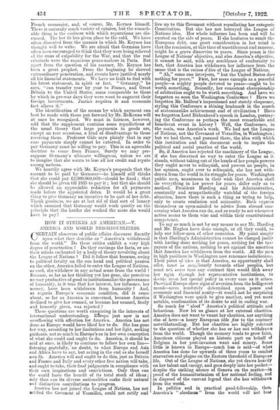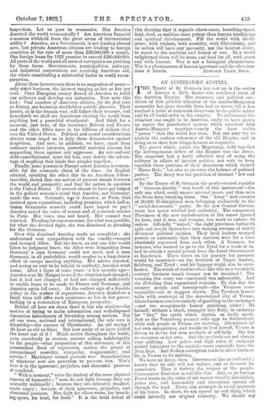C ERTAIN observers of public affairs discourse fluently upon what they
describe as "America's withdrawal from the world." Do these critics exhibit a very high degree of penetration ? Do they envisage the facts, or are their minds enchanted by a body of theory revolving about the League of Nations ? Did it follow that because, owing to political fatuity on the one hand and political passion on the other, America failed to enter the League of Nations, es such, she withdrew in any actual sense from the world ? Because, so far as her thinking yet has gone, she perceives no way productive of good to institutionalize the governance of humanity, is it true that her interest, her influence, her money, have been withdrawn from humanity ? And, as regards Europe's economic condition, did it come about, so far as America is concerned, because America declined to give her counsel, or because her counsel, freely and honestly given, was rejected ?
These questions are worth examining in the interests of international understanding. Earope just now is not overflowing with affection for America. America has not done as Europe would have liked her to do. She has gone her way, according to her limitations and her light, seeking guidance, not so much in Europe's as in her own conception of what she could and ought to do. America, it should be said at once, is likely to continue to follow her own line— listening gratefully, no doubt, to what Europe and Asia and Africa have to say, but acting in the end as she herself sees fit. America will and ought to do this, just as Britain and France and Italy and every other free nation will take, and ought to take, their final judgments in compliance with their own inspirations and convictions. Only thus can the world have the benefit of its total stock of ideas ; only thus can its diverse nationalities make their natural sad distinctive contributions to progress. America has not joined the League of Nations, has not Natified the Covenant of Versailles, could not ratify and live up to this Covenant without repudiating her categoric Constitution. But she has not betrayed the League of Nations idea. Her whole influence has been and will be exerted on the side of peace. If she hesitates to remit the European debt, one great consideration in her mind is that the remission, at this time of unsettlement and rancour, might be a grave disservice to peace. Since peace is the League of Nations' objective, and also America's objective, it cannot be said, with any semblance of conformity to fact, that America has withdrawn her influence from the cause that is the raison d'are of the League of Nations. "An," some one interjects, "but the United States does nothing for peace." First, her mere example as a peaceful people—a mighty people devoted to peace ought to be worth something. Secondly, her consistent championship of arbitration ought to be worth something. And have we forgotten so soon the Washington Conference ? Have we forgotten Mr. Balfour's impassioned and stately eloquence, styling this Conference a shining landmark in the march of statesmanlike achievement and of civilization ? Have we forgotten Lord Birkenhead's speech in London, portray- ing the Conference as perhaps the most remarkable and benellcent event in history ? Well, the Conference, in the main, was America's work. We bad not the League of Nations, not the Covenant of Versailles, in Washington ; but we had there, and pursued there, the idea with which this institution and this document seek to inspire the political and social practice of the world.
So, if America has rejected the machinery of the League, if she has discerned no way to enter the League as it stands, without taking out of the hands of her people powers they ought never to relinquish, and powers no people, in her opinion, ought ever to relinquish, she has not with- drawn from the world in its struggle for peace. Washington public men, unanimous in their wish that America shall do everything in her power for peace. differ only as to method. President Harding and his Administration, constantly and sympathetically watchful of the foreign situation, know there is such a thing as trying to help, only to create confusion and animosity. Both express themselves as open-minded to advice from abroad con- cerning what America can do, and as ready to act whenever action seems to them wise and within their constitutional competence.
To say so much is not by any means to say Mr. Harding and Mr. Hughes have done enough, or all they could, to help our fellow-men of other countries. My point simply is that Harding's Administration cannot be charged justly with having done nothing for peace, nothing for the tax- payers of the nations, nothing to set against the assertion that America has withdrawn from the world. All the men in high positions in Washington now renounce isolationism. Their point of vics is that America, as opportunity shall offer, must. ;Jr neigIlbourly towards other peoples, but must no. enter into any contract that would filch away her ngitt through her representative institutions, to decide ureei her special policy in every case as it arises. Prervied-Burope show signs of aversion from the belligerent mood—seem resolutely determined upon peace and economic and financial sanity—it would. not be surprising if Washington were quick to give another, and yet more notable, confirmation of its esire to aid in ending war.
So much for " aloof " America's political attitude and behaviour. Now let us glance at her external charities. Aynerica, does not want to vaunt her charities, nor anything else of hers—a hoary European idde ft= to the contrary notwithstanding. But her charities are highly relevant to the question of whether she has or has not withdrawn from the world. Though the memory tends to grow faint, American citizens played an historic part on behalf of Belgium in her post-invasion want and misery. Some little is known in Europe—much less is said—of what America has done for upwards of three years to combat starvation and plague on the Eastern threshold of European life. Out of the League of Nations, she yet draws heaxill on her talent and energy, and goes deeply into her pocket-- despite the striking silence of Geneva on the matter—ia proof of the humanitarianism of her national feeling, and in disproof of the current legend that she has withdrawn from the world.
In politics and in practical good-fellowship, then, America's " ,aloofnees " from the world will not beat Inspection. Let us pass to economics. Has America deserted the world economically ? Are American financial resources withheld from the great arena of international utility? America, as a Government, is not lending abroad now, but private American citizens are lending to foreign countries at the rate of more than £20,000,000 a month. Our foreign loans for 1922 promise to exceed 000,000,000. All parts of the world and all sorts of enterprises are profiting by these loans. Governments, municipalities, railways, and industrial corporations are receiving American aid, the whole constituting a substantial factor in world recon- struction.
About these investments there is no suggestion of usury— only strict business, the interest ranging as low as five per . cent. Once European money flowed to America to build our railways and develop our industries. Now note this fact : Vast numbers of American citizens, for the first time in history, are becoming stockholders outside America. Their hearts, as is the human way, will follow their treasure, and henceforth we shall see Americans viewing the world from anything but a parochial standpoint. And think for a moment, just here, of the insurance Britain and France and the other Allies have in the billions of dollars they owe the United States. Political and moral considerations always must impel us to help these democracies against despotism. And now, in addition, we have, apart from ordinary market interests, powerful material reasons for supporting them against any aggressor. An out-and-out debt-cancellationist, none the less, may descry the advan- tage of anything that binds free peoples together. Finally, some persons in Europe assert America is respon- sible for the economic chaos of the time. _ An English admiral, speaking the other day to an American fellow- traveller, stated that one nation at present stands between the world and prosperity, and that the nation in question is the United States. It seemed almost to have got lodged in the gallant seaman's mind that America, not Germany, made the war. Seriously, was it America, at Paris, that insisted upon reparations, incEding pensions, which half-a- dozen Germanies scarcely could have hoped to pay ? America raised the voice of reason and of economic science in Paris. Her voice was not heard. Her counsel was rejected. Pleading for common sense, for what was possible, for what she deemed right, she was dismissed as pleading for the Germans.
Over this dismissal America made no complaint ; she understood and sympathized with the cruelly-wronged and ravaged Allies. But she knew, as any one who would listen to Judgment knew, the Allies were demanding from Germany a sum Germany could not meet, and a sum Germany, in all probability, would employ in a long-drawn effort to escape meeting anything. Her advice rejected, and seeing no way to be helpful to anybody, America went home. After a lapse of some years—a few months ago— America sent Mr. Morgan to see if the situation had changed ; but it had not changed, or had not changed sufficiently to enable loans to be made to France and Germany, and America again fell away. At the earliest sign of a feasible policy in the matter of reparations, America doubtless a third time will Offer such assistance as lies in her power, looking to a restoration of European prosperity. Behind all here set clown there is but one motive—the motive of trying to make information and well-disposed discussion instruments of friendship among nations. For all our woes, national and international, the sole cure is friendship—the essence of Christianity. An old saying ? At least as old as Sinai. But how many of us have picked the heart out of it ? Minds active throughout the world, pens ceaselessly in motion, orators calling indefatigably to the people—what proportion of this utterance, of this measureless flood of expression, carries the gospel of international morality, sympathy, magnanimity, and service ? Machinery cannot prevent war. Superficialities of whatever sort are powerless to prevent war. War's base is in the ignorance, prejudice, and elemental passions of mankind.
"Wait a moment," cries the student of the more physical aspects of humanity ; "men do not fight because they are mutually unfriendly; because they are ridiculed, insulted, made angry ; because of their ignorance, prejudice, and elemental passions. Men fight for elbow-room, for breath- ing-space, for land, for food." It is the fatal defect of this doctrine that it regards elbow-room, breathing.spaeo, land, food, as realities more potent than human intelligenci and spiritual development. Fill the world with intern. gence, with wisdom, with morality, with Christianity, and no nation will have any necessity, nor the faintest desire, to resort to the madness and horror of war. In a world enlightened there will be room and food for all, with peace and with honour. War is not a biological phenomenon. War is a phenomenon of human ignorance and the abomina-







































 Previous page
Previous page